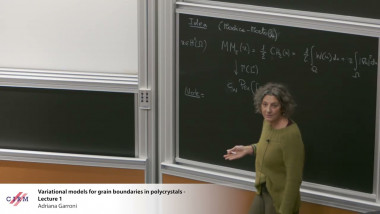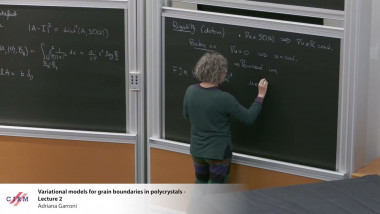
Variational models for grain boundaries in polycrystals - Lecture 1
By Adriana Garroni

Variational models for grain boundaries in polycrystals - Lecture 2
By Adriana Garroni
Appears in collection : Herglotz-Nevanlinna Functions and their Applications to Dispersive Systems and Composite Materials / Fonctions de Herglotz-Nevanlinna et leurs applications aux systèmes dispersifs et aux matériaux composites
In collaboration with Patrick Joly (Poems, Cnrs, Inria, Ensta Paris) and Adrien Semin (Technische Universität Darmstadt). We consider the problem of a numerical resolution of a weighted wave equation on a fractal tree, which originates from an asymptotic modelling of sound propagation in lungs. Performing numerical simulations for this model relies on truncation of the computational domain to a finite tree. This is done by imposing a Dirichlet-to-Neumann (DtN) boundary condition at the ends of the truncated tree. The symbols of the DtN operators are Herglotz-Nevanlinna functions, and their Herglotz-Nevanlinna property is intimately related to the stability of the problem. Because in practical simulations we have to approximate the DtN operators, the stability of the approximated problem can be ensured if the approximated symbols of the DtNs are Herglotz-Nevanlinna functions as well. One such approximation is given by truncating to finitely many terms the meromorphic series representing the symbol of the DtN. We present the convergence analysis of this method, which relies on the estimates on the counting function for the weighted Laplacian and on the normal traces of the eigenfunctions. We finish the discussion with numerical experiments.
